Ponder
A tool for deliberate practice in text based courses. Ponder offers automatic assessment and feedback on a wide variety of practice assignments.
Automatic Assessment and Feedback
Ponder is designed to facilitate deliberate practice with rapid formative assessment through automatic assessment and feedback.A key goal with Ponder is to enable deeper forms of learning and understanding, instead of mere remembering.
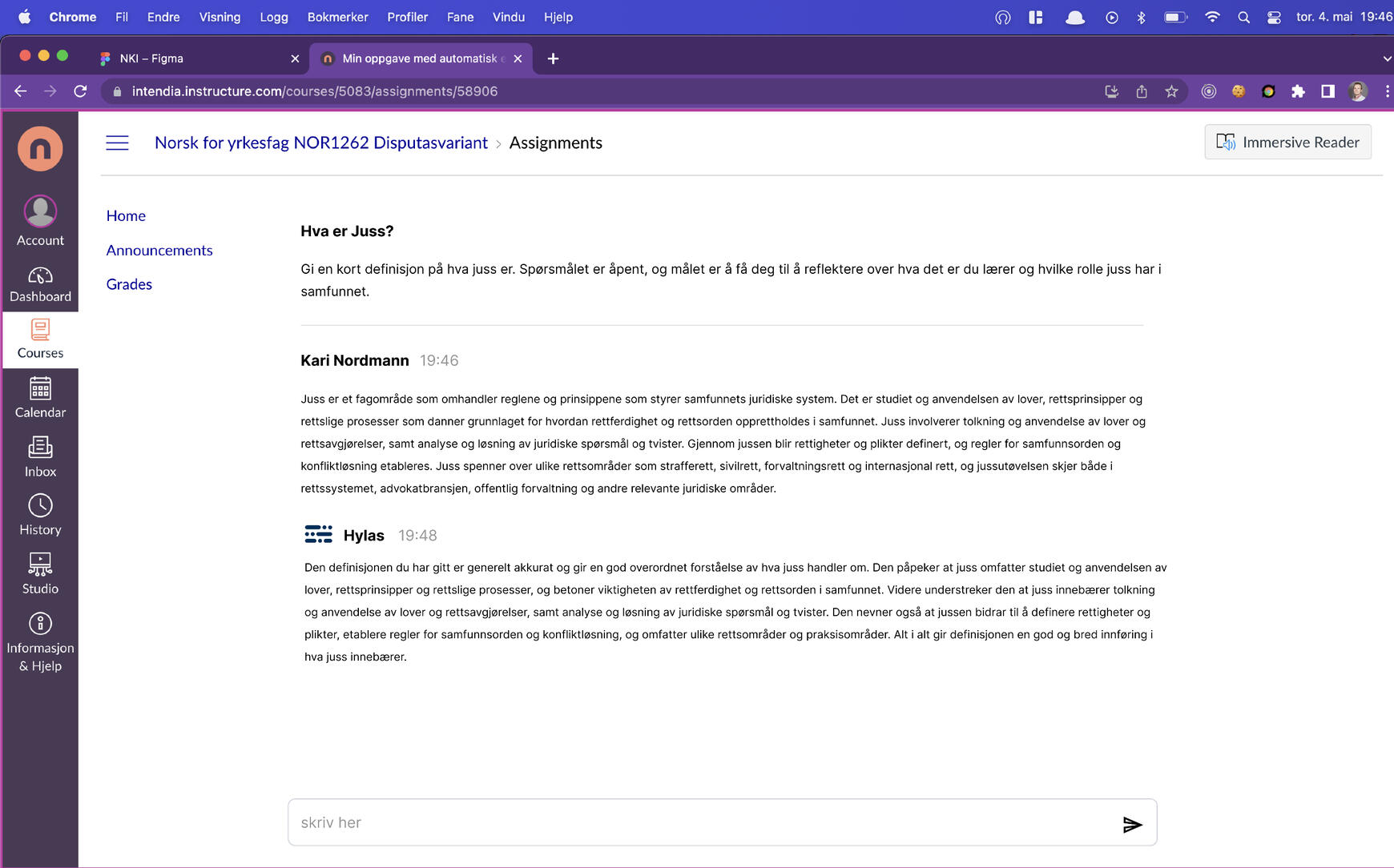
Integration and Flexibility
Use one of our digital interfaces for solving practice assignments, or integrate Ponder to your digital learning management system (LMS). When a student finds Ponder assignments in your LMS, their work is automatically stored to their LMS user. Data is processed, sent and stored safely in the LMS.
Intuitive interface for making AI-powered assignments
Teachers make assignments by filling out a simple form.
(i) Title
(ii) Subject and grade level
(iii) Assignment instructions
(iv) Teaching goals (assessment criteria)
(v) Suggested answer (optional).Instructors have control over the style of the feedback. By providing a suggested answer to a question, our original prompt engineering techniques significantly reduce the likelihood of error.
Quality Control and Learning Analytics
Ponder offers an intuitive system for doing quality control of AI-generated feedback. The system also collect anonymized data for learning analytics. These data kan be used to determine difficulty for individual practice assignments, and to detect assignments with instructions that are hard to understand.
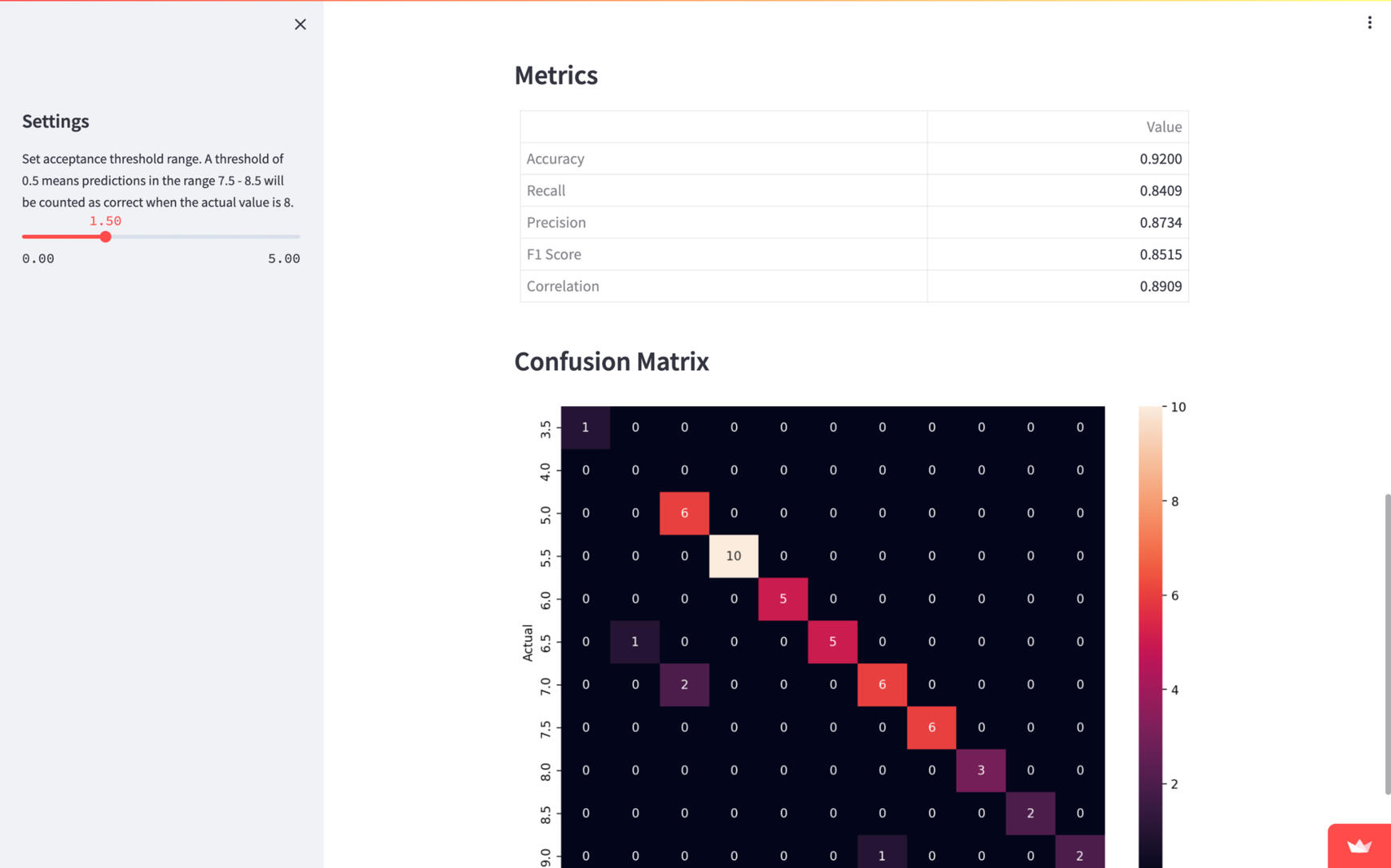
If Ponder has piqued your interest, the next step is to talk with us about how Ponder can improve learning at your organisation. Hit the button below to get in touch.
Media
Read our latest articles to learn more about the company and the development of Ponder.
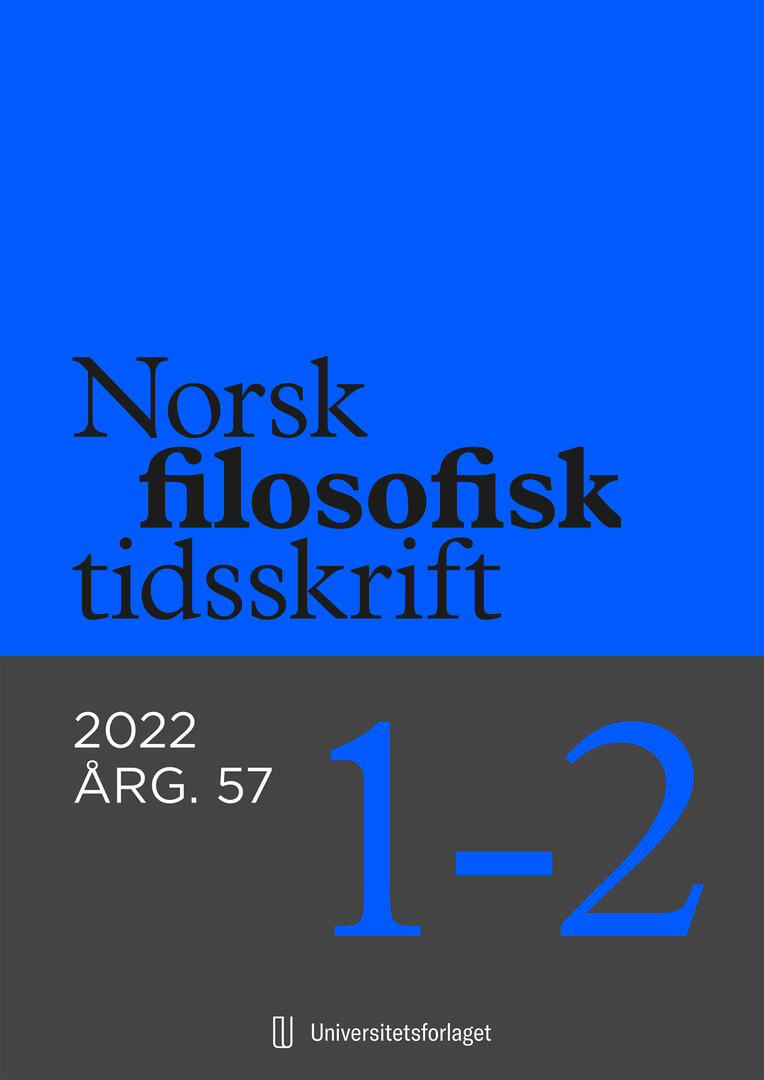
Educational technologies for active learning and formative assessment - Research article to the peer reviewed journal Norsk Filosofisk Tidsskrift

Norwegian Artificial Intelligence Research Consortium (NORA) newsletter introduction to Disputas
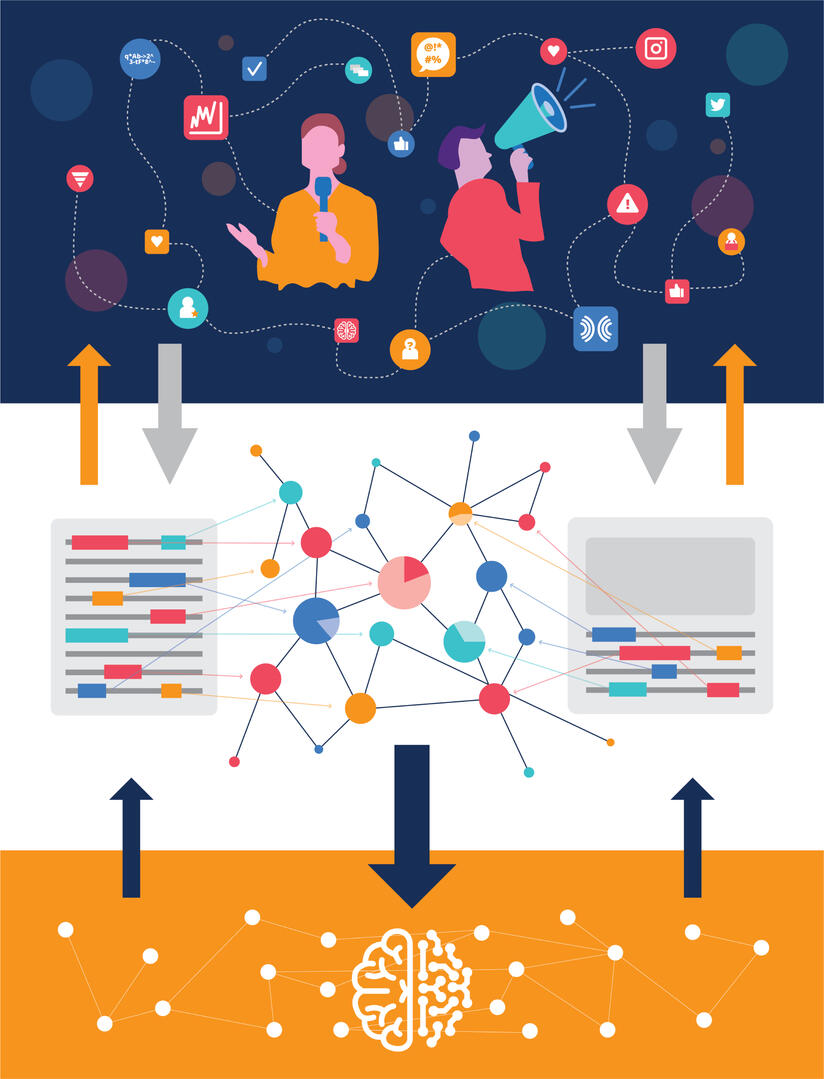
Technologies to bolster public debate - Invited piece to Teknovatøren
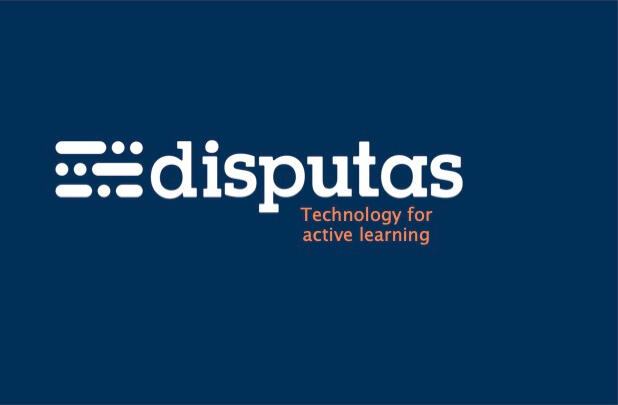
How EdTech is the foundation for developing an AI that can reason - Presentation of project idea for STUD-ENT grant
© Disputas AS. All rights reserved.
About us
Disputas was founded in 2019 by Anders Næss Evensen, Andreas Odland Netteland and Paal Fredrik Skjørten Kvarberg. Our progress was accelerated by the financial support of several Norwegian state institutions. The team now includes programmers, designers and advisors.The idea for our project was born from a need felt at Norwegian Universities, and we have been lucky to be mentored by professors at the University of Oslo and the University of Bergen. We have also benefited greatly from the help of many volunteers and interns. This page introduces the persons and organisations behind Disputas.
Anders Næss Evensen
Anders Næss Evensen has studied languages for several years, and has a master degree in language technology from UiO. He has many years of experience working as a data-analyst at Itera. In Disputas, Anders has overall responsibility for the backend and functionality related to artificial intelligence and language technology.
Paal Fredrik S. Kvarberg
Paal Fredrik Skjørten Kvarberg has a master's in philosophy from the University of Bergen, and has studied sociology and computer science at the University of Oslo. His article on computer-assisted learning of critical thinking skills was recently published to a peer-reviewed journal. Paal coordinates activities at Disputas and works actively with the design and development of Ponder.
Jon Axel Rosen
Jon Rosén has a bachelor's degree in philosophy from the University of Bergen and is now pursuing a master's in philosophy at the University of Oslo while simultaneously doing a masters in psychology (profession), also at UiO. Jon has been with Disputas since the summer of 2020. He is continuously striving to make the interaction with Ponder easy, educational and fun.
Solveig Selseth Nygaard
Solveig Nygaard Selseth holds a master degree in philosophy and is now pursuing a degree in computer science at the University of Oslo. Solveig contributes to setting up the infrastructure for the AI models we use to check semantic similarity in practice tasks.
Martin Skurtveit
Martin Skurtveit has a bachelor's degree in computer science from NTNU. He is employed as a senior developer and team lead at SIKT, where he develops the infrastructure for educational technology in Norway. At Disputas, Martin is responsible for universal design, agile processes, and organisational procedures.
Frans Joakim Titulaer
Frans Joakim Titulaer is a software engineer with experience from teaching and regulation of learning technology. He has a masters degree in science and technology studies from the University of Oslo, and has worked for the educational agency of Oslo state municipality. He recently completed the SALT applied technology boot-camp and is quickly building expertise as a full-stack developer. At Disputas, Frans works with both the design and frontend of Ponder.
Vahid Niamadpour
Vahid Niamadpour holds a Ph.D. in applied linguistics specializing in Teaching Methodology and Argumentation. He is a former visiting researcher at the University of Amsterdam and Leiden University. With over 15 years of teaching experience at high school and university levels, he has demonstrated expertise in teacher training, language assessment, and syllabus design. Additionally, he is interested in Large Language Models (LLMs) and Natural Language Processing (NLP)









Privacy
Terms of service
These are Disputas’ terms of use for the web-based application Ponder. By using the Service, you accept these terms, and enter into a binding agreement with us.
Privacy policy
This privacy policy applies to Disputas in relation with the “Ponder”, and "PonderWeb" service. We are responsible for processing personal data that is described in this privacy policy, and for controlling the use of said data.
Cookie policy
We make use of cookies in order for our website to work as intended, and to gather information about how our users interact with the website. A “cookie” is a small file that is saved on your device when you visit our website.
Privacy Policy for Disputas
Last updated: 19.03.2022
This privacy policy applies to Disputas in relation to the “Ponder”, and "PonderWeb" service. We are responsible for processing personal data that is described in this privacy policy, and for controlling the use of said data. Our contact information can be found at the bottom of this page.Disputas will not share personal data in other cases or in other ways that is described in this privacy policy, unless the user gives consent to this.1 Who we process personal data from
We collect and process personal data from visitors of our website and users of the Service.2 Purpose, types of personal data and legal basis for processing
Section 2.1 to section 2.4 of this privacy policy gives an overview of our purpose for processing of personal data, the kinds of personal data we process, and the legal basis for the processing of personal data.2.1 Personal data processing related to the registration of a user account with the Service
In connection with the registering and management of your Service user account, we process the following personal data:
Name and surname
Date of birth
Email address
Year of study and place of studyThis personal data which is collected when you create a user account will be used to deliver the Service to you and to manage your user relations with us. This involves connecting your user data to the texts you produce in so that you can easily manage and recall your work. In addition, the data will be used to create statistics of the userbase.For any processing that is described in this section, the legal basis for processing is either GDPR Article 6 a) (consent), Article 6 b) (agreement), or Article 6 f) (legitimate interest).The purpose of processing personal data in relation to your user account, is for us to use personal data to create data on the Service based on demographics and place of study, and to offer a better user experience.2.2 Interactive data processing related to the use of the Service
In relation to your use of the Service, certain information of your interaction with the program, such as comments, analyzes, classifications and assessments that you perform in the program, will be registered (“Interaction data”). This information will be processed in order for us to offer you access to the tools and services, in addition to making it easier for you to access your own Interaction data. The legal basis for processing Interaction data is either GDPR Article 6 a) (consent) or Article 6 b) (agreement).We will also connect your Service user account data to the Interaction data you produce. We process this information with the purpose of creating statistics to improve our services. The legal basis for this data processing is GDPR Article 6 f) (legitimate interest).2.3 Anonymization of interactive data
Interaction data we collect from you will be stored in a database which is separated from your user data and your personal information. If you wish to delete your user account, any connection between the Interaction data, user data and personal data will be removed in a way which makes the Interaction data fully anonymized and impossible to track back to you as a person. This means that we can and will keep any Interaction data that you have produced if you delete your user account or request your personal information to be deleted.We will also, regardless of whether you have deleted your account or requested deletion, periodically anonymize Interaction data for the purposes of developing our services or to cooperate with third parties. We may also hand over anonymous data to research institutions for research purposes.2.4 Cookies
We use cookies when you use our Service or visit our websites under the disputas.no-domain. These cookies are used in accordance with this privacy policy. A closer description of our use of cookies can be found in our cookie policy.3 Data storage
Disputas reserves the right to store personal data connected to your user account for as long as needed, and for a maximum time of twelve months. This reservation does not apply if the user requests the data deleted in accordance with GDPR Article 17.3.1 Who do we share personal data with?
Personal data will never be sold or transferred to any third parties, except when expressly stated in section 3 of this privacy policy.We enter data processor agreements with any third parties which we share your personal data with, or which otherwise process data on behalf of us. These agreements shall ensure that your personal data is processed in accordance with our privacy policy.Below is a general description of the data processors we make use of:
Our providers of ICT-services will have access to personal data if the data is stored at the provider, or if the provider gets access to the personal data in accordance with an agreement with us. This will for instance apply to our provider of cloud services, Google Cloud.
Our providers of Cookie-services will have access to personal information about you as far as is reasonably necessary for the cookies to work when you visit our website. Read our cookie policy for more information.3.2 Google cloud
Personal data we collect about you will be stored in Google Cloud. This means that Google has insight in the stored personal information, as Google is responsible for the security of the storage. In order to minimize the security risks associated with using Google as a data processor, we make sure your personal data is saved exclusively on servers within the EEA, and we avoid saving sensitive personal data on their servers in case of a security breach. We find there to be an overall low risk of harm, both in likelihood and potential severity.3.3 Sharing of data with academic institutions
Disputas reserves the right to transfer Interaction data to academic institutions. Personal data may be processed by such institutions alongside the Interaction data, in accordance with this privacy policy. These data are processed with research and educational purposes.4 The user’s rights
The user has full ownership of its personal data. By using the Service, you are given the rights described in the GDPR Chapter 3, including the right to:
Withdraw your consent: If the user wishes to withdraw any consent regarding the processing of their personal data, this can be done at any time.
Request erasure or rectification: If the user wishes erasure or rectification of personal data we process, this will be arranged by Disputas. We will however remind the user that anonymous Interaction data created by the user will not be deleted, as they are not personally identifiable on their own. Only identifiable data will be erased or changed.
Get insight into any personal data we hold about you: We give insight in the personal data connected to the user upon request.
Have your personal data delivered to you (data portability): The user may have its data delivered in a digitally portable fashion upon request.If you disagree with the way we process your personal data, you can contact us or the Norwegian Data Protection Authority.5 Security
Disputas is committed to establishing procedures to handle your personal data with utmost care in accordance with applicable rules and regulations. The measures we undertake are technical and organizational in nature, and we will regularly carry out security assessments and control in our systems that are used to process the personal data.6 Changes in the privacy policy
We reserve the right to make changes to this privacy policy. In the event of significant changes, we will notify you directly of the changes to the email address you have provided to us. You will always find the latest version of this privacy policy on our website.7 Contact us
Disputas can be reached via email to post@disputas.no. The Norwegian Data Protection Authority protects your right to privacy, and can be reached on https://www.datatilsynet.no/en/about-us/contact-us/.
Terms of service
Last updated: 30.08.2021
These are Disputas’ (“we”, “us” or “the company”) terms of use for the web-based application Ponder and PonderWeb (disputas.no, hereafter “the Service” or “the Program”). By using the Service, you accept these terms, and enter into a binding agreement with us.In order to use the Service, you have to agree to the terms of use as a whole. The terms of use are in effect as long as you make use of the Service on the webpage. We expect you to read through all the sections of the terms of use before you decide whether to use the Service. Should you have any questions regarding the company, our terms of use or our privacy policy, we can be contacted via email to post@disputas.no.
1 - About the service
The Service is a web-based application which helps students understand the line of reasoning in a text by interpreting, modelling and evaluating content using functions inspired by innovative language technology. The Service makes analytical methods, visual instruments and language technology tools available, simplifying and assuring quality in the reading and writing process for students.
2 - Purpose of the Terms
These terms of use are meant to express our expectations of your usage of the Service, and shall give you important information about how the Service functions. The terms of use shall ensure predictability concerning your rights and obligations when using the Service, and shall make it easy for you to get answers for practical or legal questions.
3 - General conditions
3.1 Ownership of the Service
The Service are protected by applicable intellectual property law and related legislation, including laws concerning protection of trademark and copyright. The Service the Service, including any associated intellectual property, belong to Disputas. This agreement shall not be interpreted as the company giving you the right to dispose of the intellectual property as your own. Your rights as a user are limited to usage of the website and the Service as it is made available to you, as long as the use takes place within the framework of these terms of use and Norwegian law. You do not have the right to modify, copy, reproduce, transfer or redistribute the Program or the Service unless this is expressly agreed upon.The terms of use apply to the Service, the website and the application as they are at all times. We will regularly update the Service and the website, and modify its functions to make the Service as good as possible. We are not responsible for any damage or loss stemming from changes we make to the Service, the website or the application.3.2 User accounts
The Service can both be used with or without an associated user account. If you have a user account on the website, you can save analyzes and share them with other users. By creating a user account, collected personal information is connected to the user account. If a user account is deleted, all associated personal information is deleted in accordance with our privacy policy, see section 5.We reserve the right to change or delete user accounts with offensive usernames, or which for other reasons represent a threat or danger to the company, the user, or others, with reasonable notice. We also delete user accounts on request of the user.3.3 Paid services
The Service will offer the purchase of digital services on the website in the future. When that happens, we will change our terms of use so that you may become aware of your rights and obligations should you make a purchase with us. We are responsible for informing you of such changes to the terms of use.3.4 Disclaimer
Disputas and our subcontractors do not guarantee the suitability, reliability, availability, security or accuracy of the Service. All information, software, products, tools and services are provided “as is” without any guarantees.Disputas and our subcontractors shall under no circumstances be held responsible for losses or damages in any form which may occur in connection with the use of the Service and our applications, as far as is possible within applicable legislation.3.5 Compensation
You agree to replace, defend and keep Disputas indemnified against and from any foreseeable claims, losses, expenses or damages stemming from your own use, misuse or inability to use our Service.
4 - Conditions regarding user generated content
4.1 General
The Service lets users create their own content (“User generated content”) on the website. The user can choose to share the content with other users on the website. The content which can be created and shared using the Service includes, but is not limited to, texts, illustrations and argument maps.When you create and share User generated content, you commit to not
upload intellectual property in violation of the copyright of third parties,
provide your own or others’ personal information, including personal contact information,
provide your own or others’ private user information such as passwords,
harm the Service or the website’s functions,
cause damage or loss for Disputas or other users,
use the Service to spread threatening, offensive or discriminatory messages about identifiable persons or groups. We do not tolerate unreasonable content at the expense of others regarding their ethnicity, skin colour, culture, language, gender, gender identity, sexual orientation, religion, outlook on life or disability.We reserve the right to remove content in the Service or on the website that is against the guidelines above or Norwegian law without prior notice. The same applies to attempted violations. We also reserve the right to exclude users who are behind such content, should the user repeatedly or seriously violate these guidelines.The company is not responsible for damage or loss occurring in connection with the use or sharing of User generated content. If the user causes a loss for Disputas by acting in violation of the guidelines for User generated content, this act shall be considered as a basis for liability for a possible claim from Disputas.We reserve the right to keep User generated content in the Service indefinitely. This applies even if the user account behind the content has been deleted. We remove User generated content from the Service if the user behind the content requests it, but we keep any language models that are built using the content.4.2 Copyright to User generated content
You keep the copyright to your intellectual property that is uploaded to the website by using the Service. The copyright includes texts and illustrations that are the result of your individual and creative effort, see the Copyright Act section 2.When you upload, share or process your intellectual property in the program, Disputas and other users of the program are given a limited right to use this intellectual property. By uploading a text in the program, the company is given an indefinite and irrevocable license to read, use, copy, process, share and sell all or parts of the intellectual property. As long as the website’s functions allow for it, other users of the Service are given a right to read, use, copy, process and share User generated content that you upload publically on the website. In return, we give you a free right to use the Service.By accepting these terms, you waive the right to be named as author in accordance with the Copyright Act section 5.4.3 Copyright to compiled Interaction data and AI-models
The website registers interaction with the Service as structured data (“Interaction data”), which we also collect. Interaction data are anonymous, aggregated data that for instance may contain information on how a user finds the lines of reasoning in a text.Interaction data is used by us in order to train language models which can be used in innovative language technologies. This Interaction data is processed and compiled by us in a way that new intellectual property arises that is protected by the Copyright Act, meaning we have the full rights to Interaction data, language models and any other intellectual property that arises in this way. This means that we have the right to keep this data indefinitely, regardless of whether your user account is deleted.4.4 Third parties’ copyright to intellectual property
Intellectual property of which you are not the author or copyright holder can also be uploaded to the service. However, you can not upload the intellectual property of others if you infringe on the rights of a third party as an author by performing the upload. By accepting these terms, you guarantee that you have the necessary legal rights to any works uploaded in the Service. We reserve the right to remove any illegally uploaded works from the Service. The company is not responsible for losses or damages arising from the user’s use of the Program which violates the intellectual property rights of third parties.If you suspect that someone is violating your rights as an author or copyright holder, you can contact us via email to post@disputas.no. We will investigate any claims of infringement of the terms of use or Norwegian law, and intervene if we find a breach.
5 - Privacy and storage of data
We process personal data in accordance with the EU Privacy Regulation (GDPR) as it is implemented in Norwegian law, see the Personal Data Act sections 2 and 4. Information about how we process your personal data and your rights in this relation, including your rights to rectification, erasure, restriction of processing, notification or portability in accordance with GDPR articles 16 to 20, can be found in our privacy policy.Interaction data as mentioned in section 4.3 are anonymized data, and are therefore not regulated by the GDPR. If Interaction data are connected to your personal data, they are no longer anonymized. Interaction data are saved in a database which is separated from where we store your personal information. By using the Service, and thereby accepting our terms of use, you accept that the company has exclusive rights to dispose of the Interaction data and that we reserve the right to refuse deleting such anonymous Interaction data.Below is a list of the Interaction data and personal data we collect and process:
Text content (analysis text)
Text content the user enters in a text field.
Uploaded articles, blog posts and other textual content written by others and published in external channels.
Textual content in comments that are made by the user in the analysis text, including rewriting of annotated textual content made by the user.
Classification of textual content into informal logical categories, including premises and conclusions.
Rewriting of the content in the analysis text into informal logical categories, and partly new and new textual content organized in such categories.
User generated evaluation
Data regarding evaluations of claims and arguments made by users. The evaluations will be made using a quantitative rating scale where the user can express how likely it is that certain statements are true or false, and how strong they think the arguments are.
Personal data connected to annotated data
Data regarding demographics, age, career and grades as supplied by educators, and other personal information about the users within applicable rules and regulations.
6 - Cookies
To collect information about the use of the Service, we use cookies. We consider this as necessary in order to give a good user experience, and to effectively adapt the Service and the website to our users. Certain cookies are necessary for the Service to function. To the extent the cookies collect personal data, we safeguard your privacy through internal routines meeting the requirements of the GDPR.Personal data obtained via cookies are shared with third parties for statistical and research-related purposes. Before we share any personal data obtained via cookies with third parties, we make a thorough assessment of the third party’s routines and security in connection with your privacy. We only share data with third parties that can guarantee and document compliance with the GDPR. You can read more about cookies and which cookies we use in our privacy policy and our cookie policy.
7 - Other conditions
7.1 Changes to the Terms
We reserve the right to change our terms of use where we find it necessary with respect to the effective operation of the Service and the website. The same applies if changes in technology, legislation, the company’s structure or industry practices make it necessary with a revision of the terms.We will give you notice within a reasonable time before we make any changes of significance to your use of the Service, but you are responsible for keeping track of the changes before you keep using the Service. We notify you about changes on our website. If we consider the change to be of greater importance, or if the change touches on your central rights and obligations after these terms of use, we will also notify you by email to the email address you have provided for us. We will not notify you by email about changes that are of smaller importance for your use of the Service. If the changes cause you any problems, you can contact us via email to post@disputas.no.In order to continue using our Service after a change, you have to accept the changes in these terms of use. Such acceptance is considered granted if you continue to use the Service and the website after having received notification as described in the previous paragraph.7.2 Reservation regarding invalidity
If a condition in this agreement is declared invalid or unenforceable, only that condition will lapse. The terms of use will continue to be legally binding as long as the remaining conditions fit.7.3 Choise of law
This agreement is governed solely by Norwegian law. Other countries' regulations are without relevance for this agreement. International conventions only apply as long as this is prescribed by Norwegian law.7.4 Territorial jurisdiction (venue)
If a dispute arises between Disputas and the user in connection with the use of the website or the Service, or in connection with the processing of the user’s data, the parties shall try to resolve the dispute by coming to an agreement. If no agreement is reached, a possible lawsuit must be filed at our venue in Oslo District Court, see the Disputes Act section 4-6 first paragraph. The rules regarding venues in the Disputes Act section 4-3 to 4-5 do not apply.By agreeing to these terms, the Norwegian courts’ competency is extended to apply to cases where a lawsuit could have been raised in a foreign or international conflict resolution body, see the Disputes Act section 4-6 second paragraph. Foreign or international conflict resolution bodies cannot be used without consent from Disputas.
Contact









